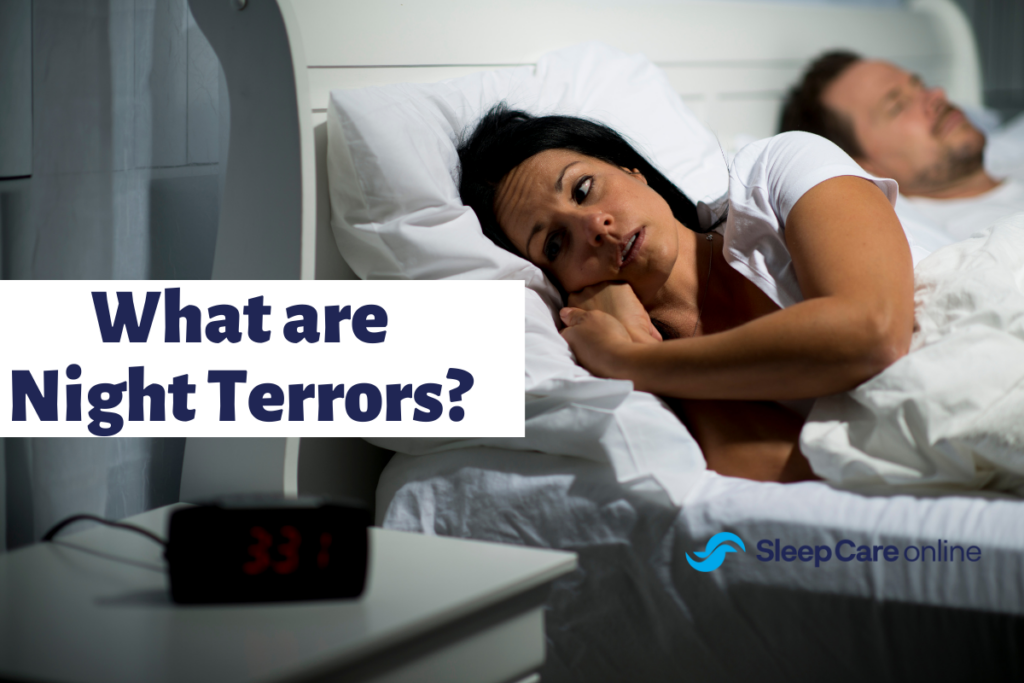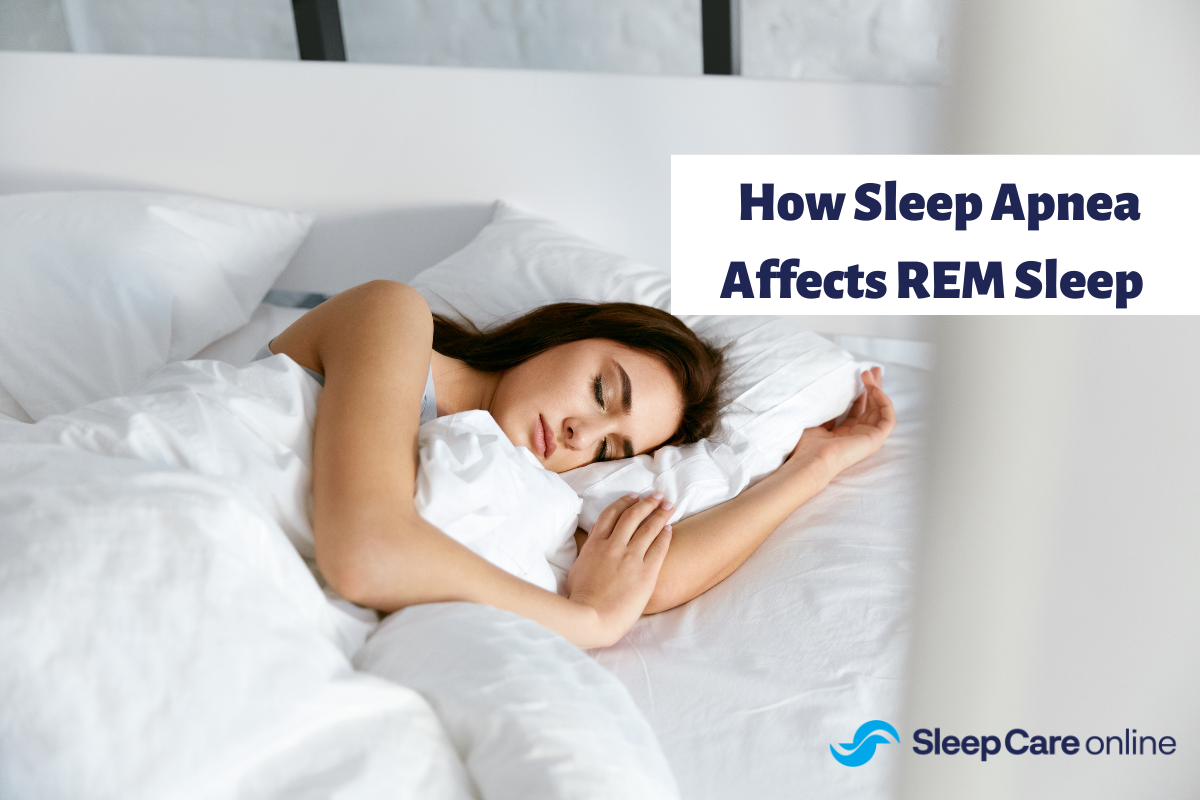Key Takeaways:
- Night terrors are episodes of screaming, intense fear, and flailing while still asleep, often paired with sleepwalking.
- Night terrors can be caused by alcohol, poor sleep, stress, and other sleep conditions, like sleep apnea.
- While night terrors may seem scary, there are ways to stop them or cope with them. Learn more here.

Night terrors are periods of screaming, fear, and flailing that occur even though you are still asleep. These episodes can last for only a few seconds or several minutes and are akin to the same state of mind as sleepwalking. Nearly 40% of children are affected by night terrors.1 The condition is less common in adults.
What Causes Night Terrors?
Night terrors are usually the result of periods of sleep deprivation, stress, or disrupted sleep schedules. Sometimes a high fever can also stimulate night terrors. Because disrupted sleep and sleep loss are leading causes, chronic sleep disorders can contribute to night terrors.
Sleep Walking
Sleepwalking is a sleep disorder that causes people to walk or perform other activities while still asleep, typically occurring in the deep sleep stage early on in the night. Several factors, including alcohol, sedatives, certain medications, medical conditions, fatigue, lack of sleep, and anxiety can all cause this condition. Sleepwalking is similar to night terrors, but the difference is that sleepwalking activity seems purpose-driven and often reflects unresolved stress from waking life.
Thalamic Dysfunction
Disorders with the thalamus, an egg-shaped structure centered in the brain, can lead to night terror events. The thalamus relays information from the brain to the body, so breakdowns in these transmissions can lead to disorienting and sometimes alarming sensory information.
Genetic Factors
Often night terrors can run in families. Generations can inherit the trait which often starts in childhood.
How Do Night Terrors Disrupt Sleep?
Night terrors cause both children and adults alike to have a more disrupted sleep. People who had a night terror may wake up less refreshed and more lethargic. That’s because episodes mostly occur during N3 sleep, the deepest stage of non-rapid eye movement (NREM) sleep. Missing out on N3 sleep means that people will not be able to get the benefits of this sleep stage. During this deep sleep, the body performs maintenance and repair to all parts of the body. This is also the only stage of sleep that is refreshing, as it eliminates any sleepiness during a normal day of activities.
Can Sleep Apnea Precipitate Night Terrors?
Like many sleep disorders, sleep apnea can also contribute to night terrors. Over a period, poor sleep due to sleep apnea may elicit these traumatic events. People who experience night terrors are more likely to have respiratory issues like sleep apnea.
What Is the Difference Between Nightmares and Night Terrors?
While nightmares and night terrors are both traumatic experiences during sleep, they are different. A nightmare usually causes you to wake up and you may recall parts of the bad dream. However, night terrors occur while you are in a state of deep sleep and you are less likely to remember any parts of your experience.
What are the Signs & Symptoms of Night Terrors?
During night terrors you may:
- scream or cry while sleeping
- stare blankly even while others are trying to get your attention
- breathe rapidly
- flail and thrash around in bed
- physically leave your bed and move around the room much like a sleepwalker
Night Terrors in Adults
While the condition is most common in children, roughly 2% of adults experience night terrors. This percentage may also be higher, as many adults without a witness to account for the events may be experiencing night terrors and never even know it. Episodes in adults usually happen during the first half of their sleep period, and typically only last for a minute or shorter.
What Are the Treatments for Night Terrors in Adolescents and Adults?
Medical Treatments
Medications
- Benzodiazepines: sedates night terror patients.
- Antidepressants: may relieve the anxiety that can trigger night terror events.
Use and side effects
While the medications can be helpful, they can lead to side effects ranging from nausea to sexual dysfunction.
Therapy
Calming exercises, especially before bedtime, can help reduce the occurrence of night terrors.
Cognitive Behavioral Therapy (CBT)
Methods in cognitive behavioral therapy (CBT) can help patients better understand and manage their disorder rather than dread it. CBT is commonly used to treat depression and anxiety, which relates to patients suffering from night terrors.
Counseling
Managing stress and anxiety through counseling can also help patients get to the root cause of their night terrors.
Sleep Environment Improvements
- Optimizing bedroom conditions-keep your bedroom as safe and as peaceful as possible.
- Comfortable mattress and pillows-staying comfortable in bed can ensure prolonged periods of sleep without interruption.
- Controlling noise and light-minimizing noise and light can help patients achieve deeper sleep cycles that help restore mind and body.
- Temperature regulation- keeping a bedroom cool helps patients sleep better.
- Safety measures to prevent injury during night terrors-take steps to prevent accidents while in the middle of a night terror event. Keep sharp objects out of reach. Make sure sharp corners on bedroom furniture are padded to prevent injury.
How to Stop Night Terrors

To treat night terrors, doctors typically look for disruptions in sleep patterns, which can be caused by a variety of factors including sleep apnea.
Because sleep apnea is so common, it may be a contributing factor to night terrors. If you think you are experiencing them, you can get a sleep apnea diagnosis quickly and easily at home.
- Ensuring a safe sleep environment: make sure your bedroom is a safe place to sleep if a night terror occurs.
- Removing potential hazards: keep harmful objects out of the bedroom or even ordinary objects that can inflict an injury.
- Using night lights or comfort objects: use night lights to help ensure calm in the event of a night terror and provide comfort objects such as plush toys to soothe and pacify a person experiencing the event.
- Techniques to calm the person experiencing a night terror: helping a person through a night terror can help the event end sooner.
- Gentle reassurance: calm the person down with soothing and gentle words.
- Avoiding sudden movements or loud noises: avoiding abrupt movements or sounds can help deescalate the event.
How to Cope with Night Terrors?
Safety First
Ensure the safety of the person experiencing the night terror. Create a safe sleeping space free of harmful objects or risks or harm from falls.
Comfort and Support
- Having a loved one who suffers from night terrors can be upsetting. Giving them support and comfort so they feel safe and protected during the event helps bring the event to a close faster.
- Speak calmly. Not moving quickly or abruptly and gently touching a person in the middle of a night terror can help them realize they are safe.
Improving Sleep Hygiene
- Having a loved one who suffers from night terrors can be upsetting. Giving them support and comfort so they feel safe and protected during the event helps bring the event to a close faster.
- Speak calmly. Not moving quickly or abruptly and gently touching a person in the middle of a night terror can help them realize they are safe.
Stress Management Techniques
- Deep breathing and meditation help manage stress and reduce anxiety.
- Lifestyle improvements including exercise, and a well-balanced diet can also promote healthy well-being. Avoiding bad habits such as alcohol and smoking can promote healthy sleep.
Therapeutic Interventions
- Cognitive-behavioral therapy (CBT) can help work toward reducing on-going symptoms of anxiety and depression. These conditions can lead to night terrors. CBT provides an effective method for managing stress-free sleep.
- Counseling and professional support can also help with managing life’s stresses. Much of the stress and anxiety in our lives can show up as night terrors. By taking time to manage stress with professional support services, you can achieve healthier sleep.
How To Take the Free Risk Assessment and Home Sleep Study?
Getting a sleep apnea evaluation is a step toward better understanding the basis of your night terrors. Start by taking the free risk assessment Sleep Care Online offers.
Additional offerings include an at-home sleep apnea test that allows you to be tested and diagnosed in the comfort of your own home, available nationwide!




